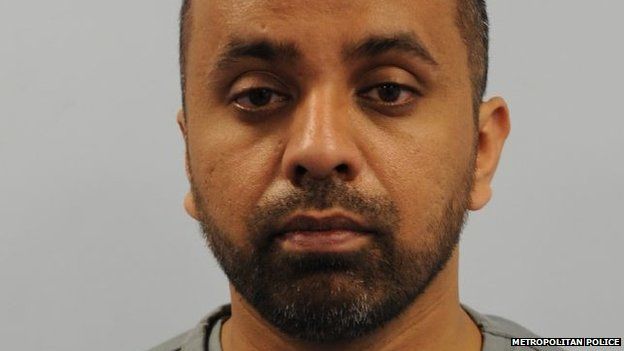Cab driver guilty of Iraq bomb murder
- Published

A cab driver has been found guilty of the murder of a US soldier in Iraq, in a roadside bombing, eight years ago.
Anis Sardar, 38, from Wembley in north-west London, built bombs as part of a conspiracy to kill Americans fighting in the country.
One caused the death of 34-year-old Sergeant First Class Randy Johnson, of 2nd Stryker Cavalry Regiment.
His conviction in a UK court for his role in the insurgency in Iraq is a "landmark prosecution", the CPS says.
Sue Hemming, from the Crown Prosecution Service, said it showed international borders were "no barrier" to terrorists in the UK being prosecuted for murder committed anywhere in the world.
'Murderous intent'
Sardar was a "highly dangerous man" who had been working with "murderous intent" against coalition forces, she added.
Police first investigated Sardar in late 2007. The following year he became an occasional volunteer counsellor for Muslim inmates at Feltham Young Offenders Institution.
He visited the prison three times between June 2008 and January 2012. Before he was allowed in, he was subjected to an enhanced criminal record and separate counter-terrorism check.
In June 2012 police searched his home and when he re-applied to continue volunteer work at Feltham, he was rejected.
Sardar was caught about seven years after the Iraq attack when FBI officials found his fingerprints on some of the bombs.
'Trapped by sticky tape'
By Steve Swann, BBC News
In court, Sardar drew a picture of himself as an academic failure who had dropped out of university, and dabbled with drugs and clubbing before discovering his faith.
He claimed he had spent a decade living in the Syrian capital Damascus, learning Arabic and Islamic Sciences, but never quite finishing a degree.
While there, he said he had become horrified at the consequences of the American-led invasion of Iraq in 2003.
Thousands of refugees flooded into Syria with accounts of sectarian killings, kidnappings and the torture of Sunni Muslims by Shia militias.
Sardar said he went to Iraq in early 2007 for a few weeks to help an Iraqi friend extract his family from the turmoil.
He repeatedly broke down in tears as he recounted what he had seen.
He admitted spending an afternoon helping a group of men in a village assemble improvised explosive devices, describing how he was asked to wrap tape around bomb components.
Read more from Steve
Initially, he denied to police that he had been involved in bombmaking, but on the second day of his trial, he admitted that his fingerprints were on two of four devices linked to the case.
He told jurors he had become involved in the Iraqi insurgency to protect his fellow Sunni Muslims from Shia militias.
He argued US soldiers had not been his targets, blaming instead "the likes of Dick Cheney, George Bush and Tony Blair" for their deaths.
Two months after Sgt Johnson was killed, Sardar was stopped at Heathrow on his way back from Syria and his fingerprints were taken.
In 2012, officers who were searching his London home as part of a separate investigation found an Arab-language bombmaking manual, with references to Islam, on a computer disc.
Sardar's fingerprints were not on the bomb that killed Sgt Johnson but all four bombs had the prints of his co-conspirator, Sajjad Adnan.
Prosecutors said Sardar and Adnan had worked with a team to build and plant the devices.
Adnan, who is not a UK citizen, was handed over to Iraqi authorities after the bombings. His whereabouts are not known.
On the day of the bombing, platoon leader Sgt Johnson, on his third military tour of duty, was looking through the hatch of his armoured vehicle for signs of buried bombs ahead.
But when the Stryker passed over a bump, the bottom scraped the surface of the track and was torn apart by the force of a bomb blast.
Gunner Elroy Brooks, sitting in the rear, was catapulted 15 metres out of the vehicle.
Sgt Johnson had been standing above where the bomb detonated.
Dying plea
His comrades dragged him on to the roof for medical attention where he pleaded with them not to let him die there. Despite desperate attempts, he did.
Three other servicemen in the vehicle suffered concussion. A fourth - Gunner Mark Aggers - was left with serious shrapnel wounds.
Of the three other bombs linked to Sardar, two were recovered intact and one was safely detonated by a bomb disposal team.
A jury of seven women and five men took just over 11 hours to find Sardar guilty of murder, by a majority of 11-1, and guilty unanimously of conspiracy to murder.
A count of conspiracy to cause an explosion was ordered to lie on file.
The defendant stayed calm as the verdicts were read out.
Sardar is expected to be sentenced at London's Woolwich Crown Court on Friday.
- Published21 May 2015